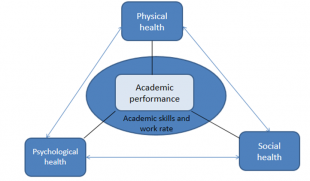Test anxiety blog series: 3
Authors: Cathy Atkinson, Kerry-Anne Brown and David Soares
We live in a climate where academic success is often measured by the results of formal testing. We know that a significant number of 14-16-year-olds in England may suffer from high levels of test anxiety this summer. As discussed in an earlier blog, test anxiety is not a new phenomenon, so we know that those who do suffer have the potential to encounter performance issues (including non-attendance, panicking, feeling overwhelmed, and/or non-completion of tests) and mental health problems. But the prevalence of test anxiety also means that we now have a good understanding of what might help those students who struggle most. Importantly, staff in schools are well-positioned to identify and respond to the needs of their students, and to offer support to those who might need it most. Additionally, it is possible to create a school culture in which the pressures of exams are recognised, discussed, managed and addressed. In this blog, we discuss how school staff can help students through the difficult and challenging period of exam time, looking at both whole-school approaches and supporting individual needs.

A holistic, whole-school approach to mental health
An Olympic sprinter would not arrive for the 100 metres final having trained extensively, but having isolated themselves or not looked after their nutrition or physical health. Gareth Hughes, a Human Givens psychotherapist working in psychological wellbeing at the University of Derby proposed the following model, which recognises that academic performance is based on physical, psychological and social needs being met in balance.

In this model, academic skills and work rate, honed by revision and exam practice, underpin academic performance. However, other factors also need to be considered to ensure optimal performance:
- Physical health, including sleep, nutrition and exercise
- Psychological health, including feeling relaxed, positive and confident about performing to the best of your ability
- Social health, including authentic contact with friends and family
Psychological support for exam stress and anxiety
There are three main areas in which schools can support students to manage anxiety about exams. These are:
- Teaching students specific examination and revision techniques to increase their sense of agency and competence
- Helping students identify, share and challenge negative thoughts about their exams, which may otherwise become overwhelming
- Providing support for managing the physical symptoms of exam stress before, during and after exams
Let’s take each of these in turn.
- Specific revision and exam techniques
Studies suggest that skill-building interventions result in increased task and examination performance and may result in associated decreases in test anxiety. These interventions can include:
- Additional support
- Study skills training and examination practice
- Teacher-guided revision in class
Such approaches contain many distinct elements that may help to reduce stress such as:
- Administration – completing personal details, equipment, exam room layout, timekeeping
- Gaining familiarity with examination format
- Understanding different type of questions
- Working under time pressure
To a better-prepared student, an assessment may seem less stressful. Therefore, for some students, it might be more helpful to develop exam skills to reduce anxiety indirectly.
- Challenging negative thoughts
Mental health professionals, including educational psychologists, are trained to deliver effective interventions aimed at reducing test anxiety. A widely-used intervention, cognitive behavioural therapy (CBT), focuses on understanding and challenging the way a student is thinking prior to exams, and paying attention to their thoughts during them. Specific thoughts that contribute to test anxiety vary from student to student, but can include: "I am going to fail"; "If I don't succeed, it means I'm not good enough"; "Everyone else will do better than me"; or "I will never be able to pass this test".
CBT can help students identify negative thoughts that undermine confidence and concentration during exam preparation and testing, by retraining the mind to switch from negative to positive thoughts. While it is not possible to offer this support to every student, the principles of CBT are accessible to both students and school staff, and can be a useful frame of reference for managing anxiety. They are exemplified by the following exercise, which could also be a starting point for dialogue between a student and supporting adult.
Negative thoughts exercise
Too often, negative thoughts pop up on us when we are not paying attention, getting in the way of our ability to focus on what is actually important. When you experience a negative thought, quickly replace it with a positive one. For example, replace, “I failed the last test because I panicked, I’ll fail it again this time,” with, “I have control over my emotions and will focus on the knowledge I have gained from studying.”
Focus on what you have done to ensure a positive exam result, and have confidence in your ability to demonstrate the knowledge you have gained through exam preparation. Do not wait until test day or until test anxiety actually strikes to start your positive thinking regime. Begin right away, using positive thinking to redirect your thoughts during study sessions and during class. So, on the day of your exam, you will be familiar with the process of positive thinking, which can help reduce test anxiety when you are sitting your exam.
It may be helpful to develop coping statements which remind you of how you can cope with a situation, such as:
- “If I get anxious, I will try some calm breathing.”
- “I just need to do my best.”
- “People cannot tell when I’m feeling anxious.”
- “This has happened before and I know how to handle it.”
- “My anxiety won’t last forever.”
Additionally, practise being ‘kind’ to yourself, using positive self-statements, rather than being overly self-critical. For example, instead of thinking, “I will fail” say something like:
- “I know I can do this.”
- “Everyone experiences anxiety. I can handle this.”
- “I’m not a loser if I have trouble with a test. Lots of students struggle with tests anyway.”
- “I’m strong enough to do this test. I will do my best.”
- Managing physical symptoms using relaxation techniques
Research suggests that teaching students relaxation techniques can help alleviate the physiological aspects of test anxiety, such as increased heart rate or feelings of nausea, resulting in a reduction in test anxiety in general. Techniques which have an evidence base include:
Diaphragmatic breathing
Diaphragmatic breathing (also called "abdominal breathing" or "belly breathing") is deep breathing which engages the diaphragm. During times of stress we often breathe from our upper chests which can create feelings of anxiety. By engaging the diaphragm we can reduce these feelings. To check, have students place a hand on the abdomen just below the ribcage and a hand on their upper chest. During diaphragmatic breathing the hand on the abdomen should move out as they breathe in and move in as they breathe out. There should be very little movement in the chest.
Guided progressive muscle relaxation
Guided progressive muscle relaxation involves progressively tensing and then relaxing muscles or muscle groups and can be undertaken by asking students to:
- Focus their mind on the muscles of their right hand and be aware of any tension.
- Inhale and squeeze the muscles of their right hand fairly tightly for 3-6 seconds.
- Release the tension in their hand and imagine any tightness or pain flowing out of their hand as they exhale.
- Relax their hand for 10-15 seconds and notice the difference between the pleasant feelings of relaxation and any tension they felt before.
Mindfulness
Mindfulness is about paying more attention to the present moment - to the thoughts feelings and world around you; while yoga is a form of exercise which focuses on strength flexibility and breathing; and guided imagery involves using an image as a way to focus the mind. This activity includes elements of these three approaches.
Ask students to close their eyes and imagine a scene, place or event that they remember as peaceful, restful and happy. After a few minutes ask them to think about the following: What can you see? Are you alone? Who is there with you? What smells are there around? What can you hear? How do you feel?
Who can help?
Consultation with your school counsellor or educational psychologist can be a useful way of finding out more about staff training; and whole-school, small-group and individual support for students experiencing anxiety.
Advice for students: Ofqual has produced a guide for students – Coping with exam pressure – in conjunction with Dave Putwain, a researcher (and former school and college teacher) at Liverpool John Moores University. Students may find this useful as they prepare for exams this summer.
Contributors to this blog series are:
Professor Kevin Woods (blog series co-ordinator)
Dr Cathy Atkinson
Kerry-Ann Brown
Dr Rob Buck
Dr Deborah Flitcroft
Dr Jo Greenwood
Amanda Hipkiss
Dr Abi James
Tamsin McCaldin
David Soares
We are a group of researchers and practitioners working at, or in partnership with, The University of Manchester Institute of Education. We have professional backgrounds as school teachers and/ or educational psychologists working in secondary, primary and special schools. Our research and professional practice covers a range of learning and well-being issues, including those relating to school examinations and tests, such as examination stress, test anxiety, and access arrangements. We are pleased to be working with Ofqual to bring our understanding of these issues to a wider audience through a series of blogs to be published over the coming weeks. These blogs are written for teachers, parents, examinations officers, and older students. We hope you find them informative and helpful.
Recent projects:
Buck, R. (2018). An investigation of attentional bias in test anxiety. Manchester Institute of Education, The University of Manchester
Flitcroft & Woods (2014). The language Key Stage 4 teachers use prior to high stake exams and how this can be adapted to suit their students. DfE ITEP-funded through The University of Manchester.
Hipkiss, A. (2014). Management of GCSE access arrangements: utilizing student feedback and observational data. ESRC-funded CASE project through the North West Doctoral Training Partnership (NWDTP).
McCaldin, T. (2015). GCSE student experience across Key Stage 4. ESRC-funded through the North West Doctoral Training Partnership.
Some recent publications:
Buck, R. (2016). An ethical approach to anxiety manipulation in school-based research. Psychology of Education Review, 40(2), 10-16.
Atkinson, C., Thomas, G., Goodhall, N., Barker, L. Healey, I., Wilkinson, L. & Ogunmyiwa, J. (2019) Developing a student-led school mental health strategy. Pastoral Care in Education. doi: 10.1080/02643944.2019.1570545
Flitcroft, D., & Woods, K. (2018). What does research tell high school teachers about student motivation for test performance? Pastoral Care in Education, 36(2), 112-125. https://doi.org/10.1080/02643944.2018.1453858
Flitcroft, D., Woods, K., & Putwain (2017). Developing practice in preparing students for high-stakes examinations in English and Mathematics. Educational and Child Psychology, 34(3), 7-19.
Woods, K., James, A., & Hipkiss, A. (2018). Best practice in access arrangements made for England’s General Certificates of Secondary Education (GCSEs): Where are we 10 years on? British Journal of Special Education, 45(3), 236-255. https://doi.org/10.1111/1467-8578.12221